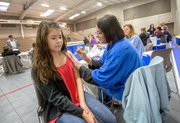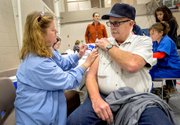This influenza season has the potential to be severe as a strain known for causing hospitalizations and deaths is not included in the vaccine now being administered, Centers for Disease Control and Prevention officials said Thursday.
"The flu season is beginning, and we are seeing some things that are concerning," Dr. Tom Frieden, CDC director, said during a news conference.
About 90 percent of flu viruses circulating in the country are H3N2, Frieden said. He said more than 50 percent of the H3N2 strains have drifted or mutated into a virus not included in the vaccine this year.
Frieden said H3N2 strains have historically been more severe than other strains. At times, the strains have caused twice as many hospitalizations and deaths as other flu viruses, he said.
Still, CDC and state health officials are encouraging the public to get vaccinated.
Frieden said four flu strains are circulating at this time: two H3N2 strains, a B strain and H1N1. He said the drifting H3N2 strain is the only one not found in the vaccine.
"Any of these could circulate at any time over the season," Frieden said. "We cannot predict what will happen over the entire season."
The vaccination also provides some immunity to the mutated H3N2 strain, Frieden said. He said it is impossible to know how much at this time.
"It is possible that we could have a season that is more severe than most with more hospitalizations and deaths," Frieden said. "If you have not been vaccinated please get vaccinated."
People older than 65, children, and those with other health risks such as asthma, heart or liver disease, and diabetes are at a higher risk. Pregnant women or women who recently delivered are also at risk.
Arkansas health officials also said that a majority of flu cases reported in the state have been H3N2. Testing is not available in the state to determine if the viruses have mutated to the more severe form.
Flu cases in the state seem to be climbing, said Jennifer Dillaha, medical director for immunizations at the state Department of Health.
The percentage of people visiting emergency rooms for flulike illnesses in recent weeks is above the 2010-14 average, according to Health Department data. The data seem to mirror emergency room visits from last year.
About 7.3 percent of all emergency room visits in the past week were for flulike illness, Dillaha said. She said it jumped from 6.1 percent last week.
There have been 44 flu-related hospitalizations in the state this flu season, the report states. There have been no deaths reported.
The Health Department increased its flu status from sporadic to localized, Dillaha said. She did not provide which regions are seeing the highest number of flu cases.
H3N2 last circulated predominately in Arkansas during the 2012-13 flu season. Flu seasons typically start in late fall and end in early spring.
Sixty-one people died from flu complications in Arkansas during the 2012-13 season. It was the second deadliest season in more than 30 years, according to Health Department data. The 2013-14 influenza season was the worst with 76 deaths. H1N1 circulated during the 2013-14 season.
Other flu seasons have had much lower death tolls in the state. The 2011-12 season had six deaths while the 2010-11 season had 11.
Seeking anti-viral medication early is also important, according to recommendations from the CDC. The medication can lessen the severity of the illness, especially if taken within 48 hours of the first symptoms.
"Treatment with anti-viral drugs can make your illness milder and shorter," Frieden said. "We need to get the message out there that treating earlier with these drugs can make a difference."
Joseph Bresee, with the CDC's National Center for Immunization and Respiratory Diseases, said there is some misconception that patients need to be tested for the flu before administering anti-viral medication.
"Many of the tests can have false negatives," Bresee said. "It is just a pattern of prescribing that is not familiar to doctors."
Lora Rice, 52, of Fort Smith was in a medically induced coma for several months after contracting the flu around Christmas last year.
Anti-viral medicine was not given to her in the first 48 hours, Rice said. Her first trip to the doctor resulted in a prescription for cough medicine. She said her doctor sent her to the emergency room after a second visit two days later.
Rice said she was given fluids and pain medicine during her emergency room visit and then sent home. Several days later she fainted while walking from her bedroom to the bathroom, she said. She was admitted into the hospital that night.
The first tests for flu were negative, Rice said.
"I knew I was very, very sick," Rice said. "I couldn't get anyone to listen to that and I couldn't get anyone to take me seriously."
Rice said she didn't know about anti-viral medication at the time. She said she would have asked for it if she had.
"It is not something to take chances with," Rice said. "It nearly killed me."
Dillaha said information has been sent to state health care providers about anti-viral medication in recent days. She said the information asks providers to inform patients about anti-viral medication. A link to the CDC recommendations on administering the medication also is included.
Metro on 12/05/2014



